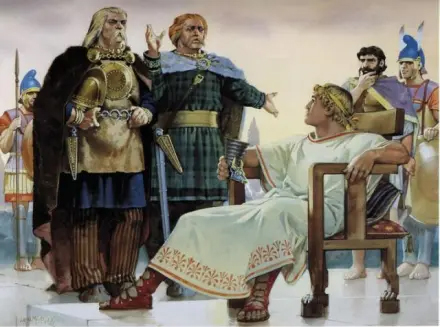Time: 11:51:07 CET
Topic: 11. Hellenes and Barbarians
Tags: history, Greece, ancient Greeks, city-states, Hellenic tribes, nation, race, language, religion, fraternal union, genealogy, Hellen, Barbarians, mythology, Deucalion, Mollis, Dorus, Xuthus, Aeolus, Ion, Achaeus

A Divided Yet Unified People: The Paradox of Ancient Greece
The ancient Greeks, despite their fierce loyalty to their individual city-states, weren't entirely isolated. Underlying the political divisions, a sense of shared heritage bound them together as a loose-knit community.
Unity in Diversity: Race, Language, and Religion
Several factors transcended political boundaries and fostered a sense of pan-Hellenic identity:
- Race: They believed in a common ancestry, tracing their lineage back to a mythical figure named Hellen.
- Language: All Greeks spoke variations of the same Hellenic tongue, facilitating communication and cultural exchange.
- Religion: They shared a pantheon of gods and goddesses, with pan-Hellenic sanctuaries like Olympia serving as unifying centers for religious festivals and athletic competitions.
Hellenes vs. Barbarians: A Us vs. Them Mentality
The Greeks distinguished themselves from outsiders by referring to non-Greeks as "barbarians," a term initially signifying someone who spoke an unintelligible language. However, over time, it acquired a connotation of cultural inferiority, reflecting the Greeks' growing sense of intellectual superiority.
The Mythological Roots of the Hellenes
(Note: This section provides additional information that can be included for a more detailed explanation but can be omitted for a concise version.)
Greek mythology offers a narrative for their shared ancestry. Hellen, son of Deucalion (the Greek Noah), supposedly had three sons: Aeolus, Dorus, and Xuthus. Aeolus and Dorus fathered the Aeolians and Dorians, respectively. Xuthus, in turn, had sons named Ion and Achaeus, who became the forefathers of the Ionians and Achaeans, respectively. These four groups – Aeolians, Dorians, Ionians, and Achaeans – constituted the major Hellenic tribes.